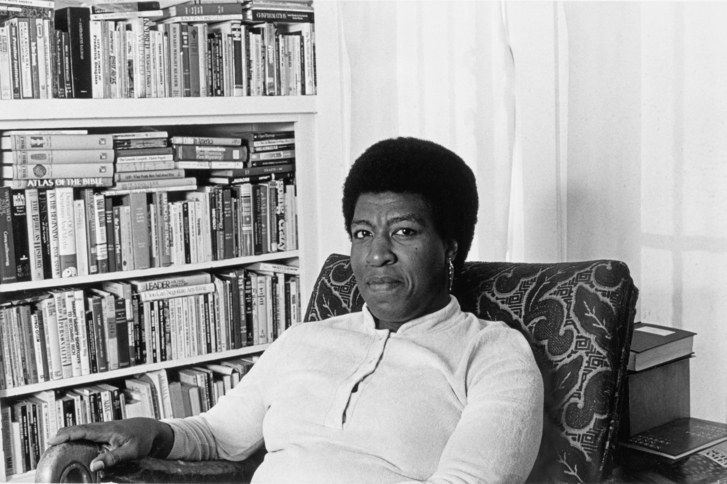Curation Unpacked: The Cultural Influences Behind Our 11th Edition
Posted on 27 January 2020 by Liverpool Biennial
Photo: Jacobo Braun
Manuela Moscoso moved to Liverpool in 2018 to curate the 11th edition of Liverpool Biennial. Titled The Stomach and the Port, Manuela’s curatorial vision explores notions of the body through three entry points – stomach, porosity and kin. We sat down with Manuela to find out about some of the key cultural influences that inspired her thinking.
BOOK: Kindred, Octavia Butler

"Kindred is really, really good. Butler keeps you on the edge of your seat with the constant possibility that something is about to happen. It’s deeply rooted in the concept of collective memory and how it operates.
"I’m very interested in the idea that history is not a linear event, but a process of folding; of knotting. I like depictions of the present that integrate the past and future, creating a sense that all time is occurring simultaneously in a way that connects and informs the here-and-now. I conceive of the body in the same way: as an archive of the past, but also a symbol of our predetermined futures. Existence can sometimes feel like a science fiction-style enactment of our physical ‘destiny’ and Butler’s exploration of time travel in Kindred perfectly encapsulates this sensation.
"What I also love about this book though, is that even someone who is not interested in these ideas can totally enjoy it because it’s just so readable. It’s emotional, suspenseful; it would be a great movie – you would be on edge the whole time! Butler is just a great example of somebody who should be read. It’s masterful story-telling as she doesn’t compromise on fiction, every detail has purpose and value."
MUSIC: Shakalaodé, Wganda Kenya
"Music I can talk a lot about! But I’m just going to talk about one track. I was always really interested in salsa. I have a long history of research in what music entails – music as a form of knowledge. I did a collaboration with a collective from South Africa called Chimurenga that included a month-long radio show at the Museo Tamayo [where Manuela worked in Mexico City] in 2017. I had many conversations with the founder, Ntone Edjabe, who is also a collaborator of LB2020 artist Neo Muyanga. I adored these conversations because Neo takes music so seriously – a seriousness that has really stuck with me.
"The track I want to speak you about is called Shakalaodé by Wganda Kenya. Wganda Kenya is one of Colombia’s most innovative live ensembles and a key proponent in bringing the boundless energy of Afrobeat to the streets and dancehalls of Colombia’s Caribbean coast. Between the 1970s and the late 1980s, Wganda Kenya formed part of a small collection of pioneering Afro-Colombian bands that ruled the country.
"Wganda Kenya’s Shakaloade is a reproduction of Fela Kuti’s Shakalao. At that time of its release, you couldn’t disseminate tracks in the way you can today. The number of vinyls – the physical thing itself – determined how far you could distribute the music. Since few copies of the original records would arrive in Colombia, new vinyls would be produced in the Colombian-Afrobeat style. Wganda Kenya’s track is a proper form of cannibalism in that in the process of reproducing something, a completely new, exciting thing is created. This is the type of appropriation that I am really fascinated by."
FILM: Under the Skin, Jonathan Glazer

"Under the Skin explores the relationship between embodiment and appearance. The film literally asks what it means to experience embodying the skin of somebody else. It actually feels a bit shamanistic: your body being a host to other bodies.
"What’s great about this film is that there are no morals. We all have ethics, of course, we have to have ethics, they’re very important. But when it comes to morals, they usually stem from specific ideologies, even though they’re presented as general. Morality often tends to be quite conservative, and I’m not interested in that. In the film, she’s a serial killer, but you’re somehow on her side – Glazer creates a sense of empathy in that she just needs to feed and you want her to survive.
"Of course, a really important element of the film is that the lead character chooses to inhabit a woman’s body. She could have easily adopted a man’s and had life way easier, but to have her in a woman’s body makes it so much more powerful. When male characters patronisingly try to ‘save’ her, she uses this an opportunity to feed. It is also interesting that Glazer choses a beautiful woman. I especially like the casting, as you are permanently conscious of the fact that Scarlett Johansson is playing this role – no attempt is made to disguise it, only [to] highlight it. As a result, you get this multiple layering of a thing that is inhabiting a woman, that is inhabiting Scarlett Johansson. There’s a continual sense of ambiguity and I think it’s done in a really intelligent way."
The 11th edition of Liverpool Biennial was scheduled to take place in 2020 but was postponed due to the COVID-19 outbreak. Now rescheduled to 2021, the programme will be delivered as originally conceived but responsive to the new context – curated by Manuela Moscoso, with the artist list announced in November 2019.
Liverpool Biennial
55 New Bird Street
Liverpool L1 0BW
- T +44 (0)151 709 7444
- info@biennial.com
Liverpool Biennial is funded by
Founding Supporter
James Moores

